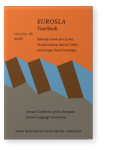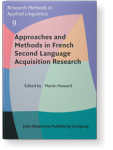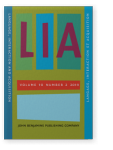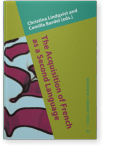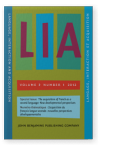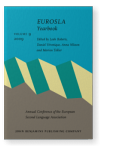Fanny Forsberg Lundell
List of John Benjamins publications for which Fanny Forsberg Lundell plays a role.
Yearbook
2025 Chapter 12. Methodology in research on individual differences and French as a second language Approaches and Methods in French Second Language Acquisition Research, Howard, Martin (ed.), pp. 286–310 | Chapter
This chapter concerns methods used in research on individual differences and second language (L2) French learning. The importance of individual differences for L2 learning is increasingly recognized in the SLA literature (e.g., Dewaele, 2009, 2011; Moyer, 2014; Douglas Fir Group, 2016), and a… read more
2019 Réseaux sociaux et développement linguistique: Une étude de cas en français L2 Language, Interaction and Acquisition 10:2, pp. 255–288 | Article
Cette étude longitudinale contribue aux recherches sur l’acquisition d’une langue seconde (L2) dans le contexte de séjour linguistique à l'étranger (Study Abroad), où l’on s’intéresse de plus en plus à comprendre comment les facteurs non-linguistiques interagissent avec le développement… read more
2018 Self-perceived linguistic progress, target language use and personality development during study abroad Study Abroad Research in Second Language Acquisition and International Education 3:1, pp. 144–166 | Article
This exploratory study investigates the development of personality dimensions related to multicultural effectiveness and its relation to amount of target language use and self-perceived progress in speaking during a sojourn abroad in seven European countries. The participants were 59 Swedish and… read more
2015 Complexity at the phrasal level in spoken L1 and very advanced L2 French Language, Interaction and Acquisition 6:2, pp. 181–201 | Article
This article examines linguistic complexity in the noun phrase in spoken L1 and L2 French. Research on linguistic complexity in L2 has often concentrated on syntactic complexity, subordination in particular. In this study, we focus on syntactic complexity at the phrasal level, i.e. in the noun… read more
2014 Vocabulary aspects of advanced L2 French: Do lexical formulaic sequences and lexical richness develop at the same rate? The Acquisition of French as a Second Language: New developmental perspectives, Lindqvist, Christina and Camilla Bardel (eds.), pp. 75–94 | Article
In her overview of research on the advanced L2 learner, Bartning (1997) aims at characterizing the advanced learner variety. This characterization is above all based on morphosyntactic traits. The aim of this contribution is to present additional characteristics of the advanced learner as defined… read more
2013 High-level proficiency in late L2 acquisition: Relationships between collocational production, language aptitude and personality Sensitive periods, language aptitude, and ultimate L2 attainment, Granena, Gisela and Mike Long (eds.), pp. 231–256 | Article
The aim of the present exploratory study was twofold. The first was to investigate how indicators of high-level proficiency (collocations and grammaticality judgment) related to aptitude in late French L2 learners. Results showed a significant positive correlation between collocations and… read more
2012 Vocabulary aspects of advanced L2 French: Do lexical formulaic sequences and lexical richness develop at the same rate? The acquisition of French as a second language: New developmental perspectives: L’acquisition du français langue seconde : nouvelles perspectives développementales, Lindqvist, Christina and Camilla Bardel (eds.), pp. 73–92 | Article
In her overview of research on the advanced L2 learner, Bartning (1997) aims at characterizing the advanced learner variety. This characterization is above all based on morphosyntactic traits. The aim of this contribution is to present additional characteristics of the advanced learner as defined… read more
2009 Resources and obstacles in very advanced L2 French: Formulaic language, information structure and morphosyntax EUROSLA Yearbook: Volume 9 (2009), Roberts, Leah, Georges Daniel Véronique, Anna Nilsson and Marion Tellier (eds.), pp. 185–211 | Article
This study builds on the proposition that there are six developmental stages for spoken L2 French, based on morpho-syntactic criteria (Bartning and Schlyter 2004). In order to investigate developmental stages ‘beyond stage 6’, oral productions of several groups of advanced learners/users and native… read more
